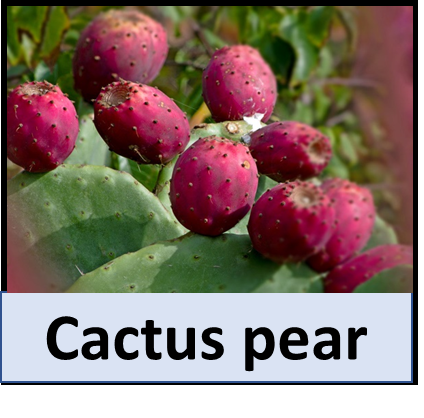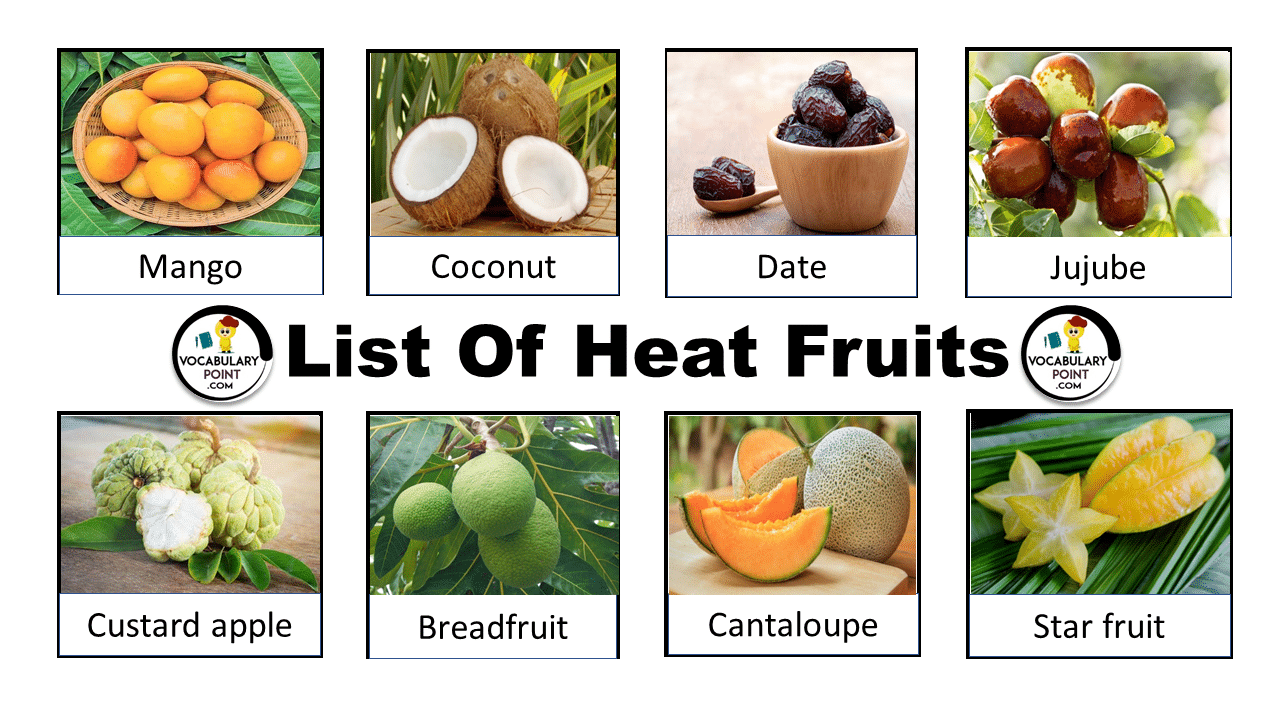In the vast world of fruits, there exists a category that brings a fiery twist to your taste buds – heat fruits. These exotic and often overlooked gems pack a punch of spice and warmth that can ignite your culinary creations with a burst of unique flavor. From the subtly spicy to the downright fiery, heat fruits add an unexpected kick to dishes in ways you never thought possible. Imagine biting into a fruit that leaves behind a lingering heat on your tongue, challenging your taste buds in the most exhilarating way possible. Prepare to embark on a journey through the fascinating realm of heat fruits as we explore their diverse flavors, uses in cooking, and the surprising health benefits they offer.
Heat Fruits Names
Miracle Berry
A fruit known for its ability to temporarily make sour foods taste sweet due to a protein called miraculin.
Soursop
A large, spiky, green tropical fruit with a sweet, creamy texture often used in beverages and desserts.
Starfruit
A yellow, star-shaped tropical fruit with a sweet and tart flavor, also known as carambola.
Strawberry
A red, heart-shaped berry known for its sweet flavor and juicy texture, popular in desserts and fresh eating.
Papaya
A tropical fruit with orange flesh and black seeds, known for its butter-like consistency and sweet taste.
Cranberry
A small, tart, red berry often used in juices, sauces, and as a dried fruit in snacks and recipes.
Jabuticaba
A Brazilian fruit that grows directly on the trunk of its tree, with a sweet, grape-like flavor.
Hog Plum
A tropical fruit, also known as yellow mombin, with a sour taste, used in jams and beverages.
Boysenberry
A large, dark purple berry with a sweet and tart flavor, a hybrid of raspberry, blackberry, and loganberry.
Gooseberry
A small, tart fruit often used in desserts and jams, available in green, red, and purple varieties.
Horned Melon
A fruit with a spiky orange outer skin and lime-green, jelly-like inside, known for its cucumber-like taste.
Coconut
A large, brown, tropical fruit with a hard shell, white meat, and clear liquid inside, used in many culinary applications.
Lemon
A bright yellow, sour citrus fruit widely used for its juice, zest, and as a flavor enhancer in dishes.
Kiwi
A small, brown fruit with bright green or yellow flesh and tiny black seeds, known for its sweet and tangy flavor.
Pomegranate
A fruit with a tough outer layer filled with sweet, juicy seeds called arils, known for its health benefits.
Prickly Pear
A fruit from the cactus species, with a sweet, watermelon-like flavor, known for its vibrant pink or green color.
Star Fruit
Identical to Starfruit; a tropical, star-shaped fruit with a juicy, sweet, and slightly tart flavor.
Raspberry
A red, pink, or black berry known for its sweet flavor and soft texture, popular in desserts and jams.
Ackee
A tropical fruit that is toxic when unripe, but when ripe, reveals soft, edible flesh around black seeds.
Ugli Fruit
A citrus fruit, a hybrid between a grapefruit, an orange, and a tangerine, known for its wrinkled, greenish-yellow skin.
Blood Orange
A type of orange with crimson, blood-colored flesh, known for its sweet and tart flavor with hints of raspberry.
Marula
A fruit native to Southern Africa, known for its yellow skin and white, juicy flesh; used in the liqueur industry.
Breadfruit
A large, starchy tropical fruit, used as a vegetable in cooking; can be roasted, baked, or fried.
Tangerine
A small, sweet, and less acidic citrus fruit with a deep orange skin that is easy to peel.
Persimmon
A sweet, slightly tangy fruit with a soft to firm texture, eaten fresh, dried, or cooked.
Pawpaw
A North American fruit with a custard-like texture and tropical flavor, resembling banana and mango.
Apricot
A small, orange fruit with velvety skin and sweet, slightly tart flesh, used fresh or dried in various dishes.
Feijoa
A green, ellipsoid fruit with a sweet, aromatic flavor, often eaten by cutting in half and scooping out the inside.
Dragon Fruit
A vibrant, tropical fruit with a mild, sweet taste, known for its striking pink or yellow skin and speckled flesh.
Cantaloupe
A type of melon with orange flesh and a netted skin, known for its sweet and juicy flavor.
Dragonfruit
Identical to Dragon Fruit; known for its unique look and mildly sweet taste, with a kiwi-like texture.
Passionfruit
A tropical fruit with a hard outer rind and a juicy, seed-filled interior, known for its sweet-tart flavor.
Kiwifruit
Similar to Kiwi; a fruit known for its edible green flesh and black seeds, with a sweet and tangy taste.
Jackfruit
A large tropical fruit with a sweet, aromatic flavor, known for its meat-like texture when cooked.
Blackcurrant
A small, tart, dark purple berry, rich in vitamins and antioxidants, often used in jams and beverages.
Mango
A tropical fruit with a sweet, rich taste and a soft, buttery texture, known for its skin that ranges from green to red.
Longan
A tropical fruit, similar to lychee, with translucent flesh and a sweet taste, encased in a brown shell.
Salak
Also known as snake fruit, for its reddish-brown scaly skin, with a sweet and acidic flavor.
Mulberry
A fruit that comes in various colors, known for its sweet flavor, used in jams, desserts, and wines.
Banana
A long, yellow fruit with a soft, sweet flesh, high in potassium, widely consumed worldwide.
Nectarine
A smooth-skinned fruit similar to a peach but with a firmer, sweeter flesh.
Blueberry
A small, blue-purple berry, known for its sweet taste and antioxidant properties, used in various culinary dishes.
Fig
A sweet fruit with thin skin and soft flesh, filled with many small seeds, eaten fresh or dried.
Olive
A small, bitter fruit harvested green or black, primarily known for the oil extracted from it.
Cape Gooseberry
A small, round fruit encased in a papery husk, with a sweet, tangy flavor, used in desserts and as a garnish.
Santol
A tropical fruit with a cotton-like texture inside, sweet and sour, used in Filipino cuisine.
Watermelon
A large, juicy fruit with a green rind and sweet, red flesh, known for its hydrating properties.
Jujube
A small, red or purple fruit, also known as red date, with a sweet, apple-like flavor when ripe.
Custard Apple
A sweet, tropical fruit with a creamy texture and fragrant flesh, known for its knobby green skin.
Buddha’s Hand
A type of citrus fruit known for its long, finger-like segments, used mainly for its zest and aromatic properties.
Plum
A juicy fruit with a smooth skin and a pit in the center, available in various colors and sizes.
Rambutan
A tropical fruit similar to lychee, with hairy skin and sweet, juicy flesh.
Miracle Fruit
Identical to Miracle Berry; alters taste perceptions, making sour foods taste sweet.
Avocado
A creamy, rich fruit with a buttery texture and green flesh, often used in salads and guacamole.
Date
A sweet, dark fruit from the date palm tree, often dried and eaten as a snack or used in desserts.
Quince
A yellow, pear-shaped fruit, hard and sour when raw but sweet and fragrant when cooked, used in jellies and desserts.
Pomelo
A large citrus fruit with a thick, green or yellow rind and sweet, slightly tart flesh.
Carambola
Another name for Starfruit; a star-shaped tropical fruit with a sweet and slightly tart flavor.
Lime
A green, citrus fruit known for its acidic juice, used as a flavoring agent in foods and beverages.
Sapodilla
A tropical fruit with a brown, sandy skin and sweet, grainy flesh, often eaten fresh or made into desserts.
Blackberry
A dark purple berry with a sweet and tart flavor, used in desserts, jams, and sometimes wine.
Cactus Pear
Another name for Prickly Pear; a fruit of the cactus species with a sweet and slightly tart taste.
Pineapple
A tropical fruit with a spiky exterior and sweet, juicy, yellow flesh, popular in many cuisines.
Lychee
A tropical fruit with a sweet, fragrant taste, rough, red outer skin, and juicy, translucent flesh.
Durian
Known for its strong odor, the fruit has a rich, custard-like flesh with a complex flavor, often called the “king of fruits.”
Guava
A tropical fruit with a green or yellow skin and sweet pink or white flesh, rich in vitamin C.
Clementine
A type of mandarin orange, small and sweet, with easy-to-peel skin and usually seedless.
Grapefruit
A large, tart, and slightly sweet citrus fruit with a yellow-orange skin, often eaten for breakfast.
Elderberry
A small, dark berry known for its immune-boosting properties, used in syrups and jams.
Plantain
A type of banana that is starchier and less sweet, often cooked before eating, used in many savory dishes.
Passion Fruit
Similar to Passionfruit; known for its sweet-tart flavor and numerous seeds surrounded by juicy pulp.
Orange
A popular citrus fruit known for its sweet juice, often consumed fresh or squeezed for juice.
Kumquat
A small, oval citrus fruit with an edible sweet rind and tart flesh, eaten whole or used in marmalades.
Black Currant
Similar to Blackcurrant; a small, tart, dark purple berry rich in vitamins, used in culinary and medicinal contexts.
Explore More Fruits Names:
Green Fruits | Dry Fruits | Smallest Fruits
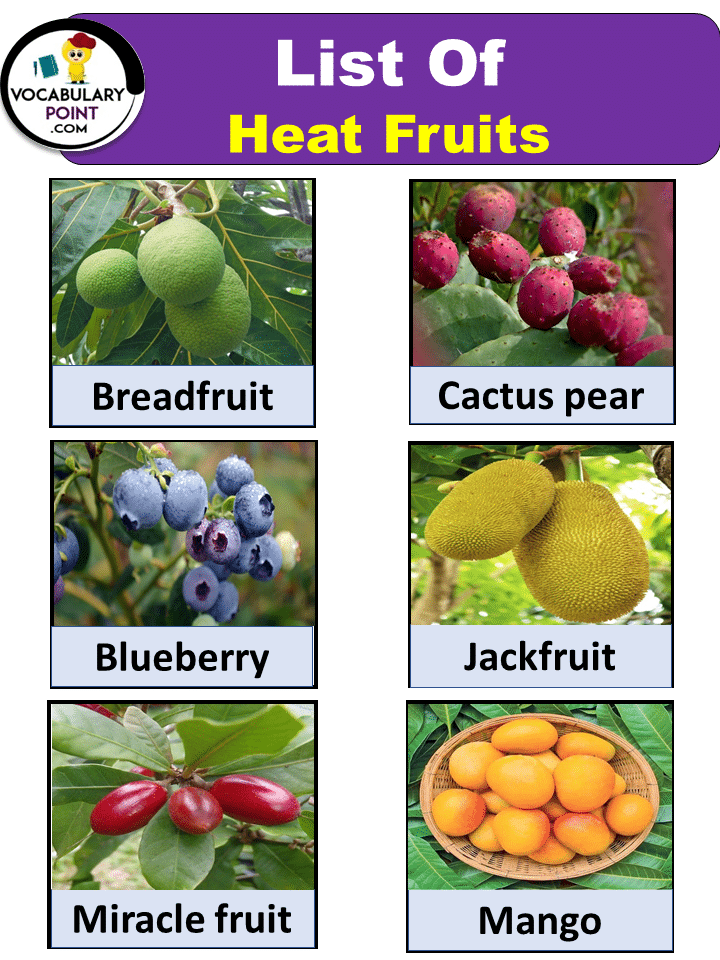
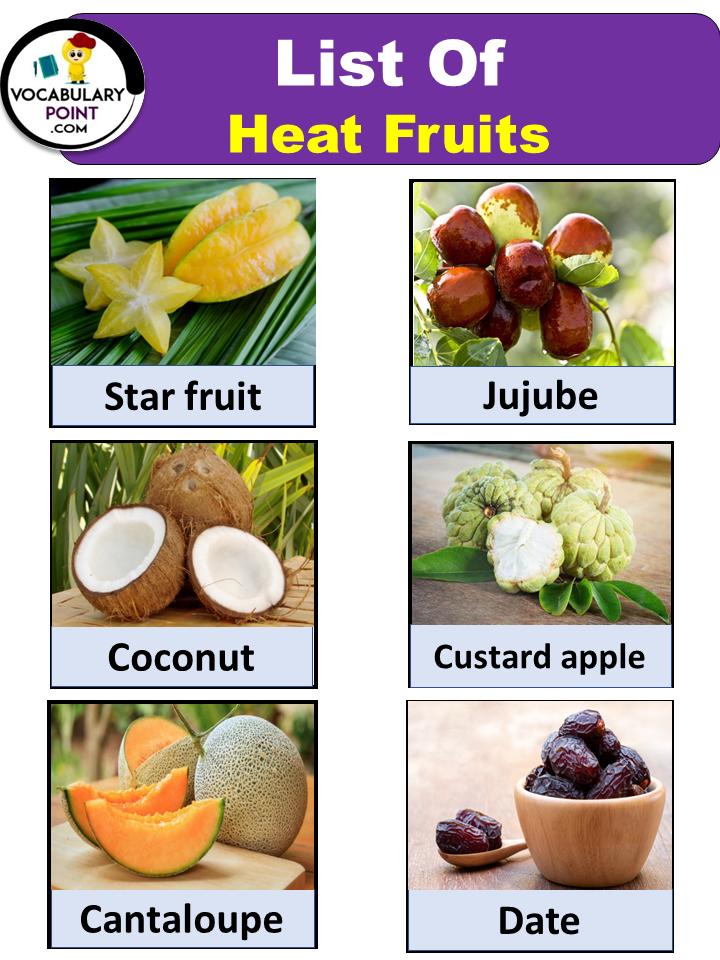
Heat Fruits Names
Star fruit
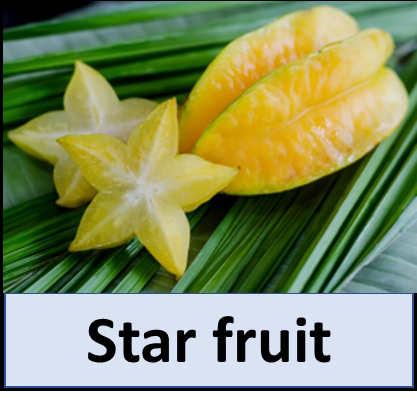
Coconut
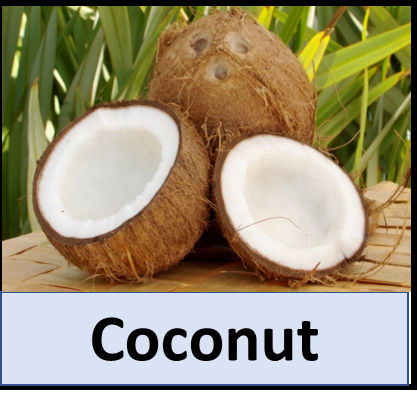
Custard apple
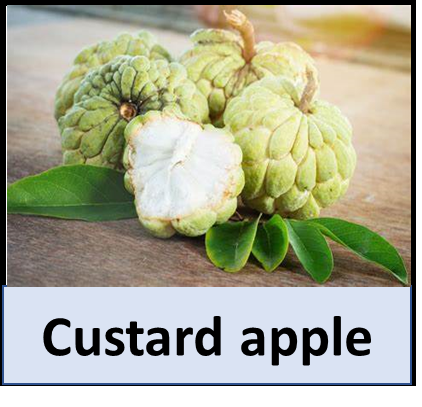
Cantaloupe
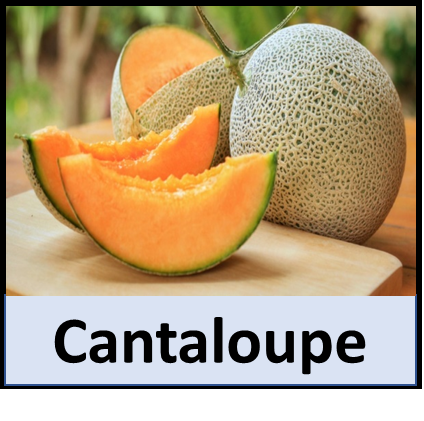

Breadfruit
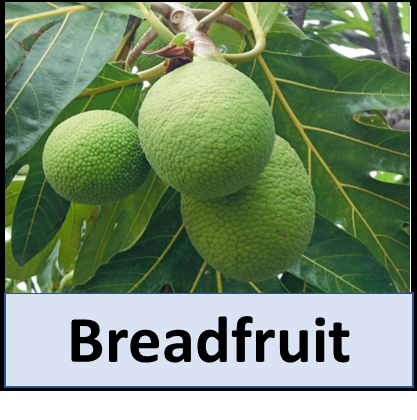
Blueberry
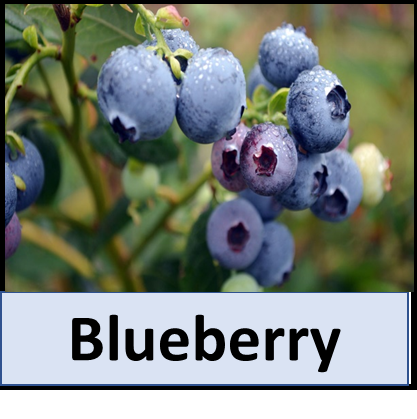
Jackfruit
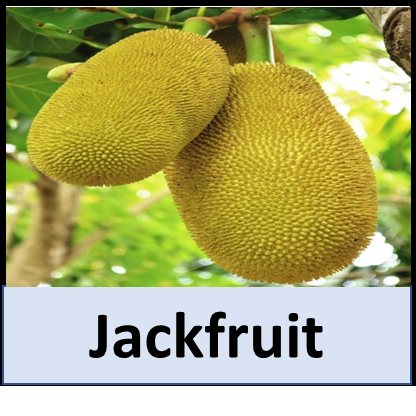
Miracle fruit
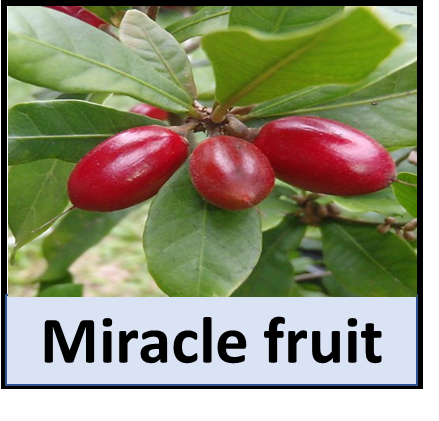
Mango


Cactus pear
